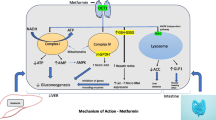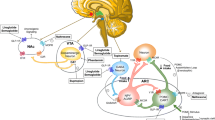Abstract
Purpose
This 2-arm crossover study compared the relative bioavailability of two dovitinib (TKI258) formulations [anhydrate clinical service form (CSF) capsule and monohydrate final market image (FMI) tablet; Arm 1] and determined the effect of food on dovitinib exposure (Arm 2).
Methods
Patients with advanced solid tumors, excluding breast cancer, were enrolled in 1 of the 2 arms of the study. Patients in Arm 1 were randomized to a single 500-mg dose of CSF capsule or FMI tablet followed by 7 days of rest and 500 mg of the other formulation. Patients in Arm 2 received 300 mg of FMI tablet daily and were randomized to follow 1 of 6 meal sequences, each with 3 prandial conditions: low fat (LF), high fat (HF), or no meal (NM).
Results
In Arm 1 (n = 21), 17 patients were evaluable. FMI tablet compared with CSF capsule showed only slight reductions in the adjusted geometric means for area under the plasma concentration–time curve (AUClast; 3 %) and maximum plasma concentration (C max; 1 %). In Arm 2 (n = 42), 19 patients were evaluable. HF meal versus NM showed a 9 % decrease in the adjusted geometric mean for AUClast and an 18 % decrease for C max. Comparison of LF meal versus NM showed a 1 % decrease for AUClast and a 10 % decrease for C max. Common adverse events suspected to be study drug related included vomiting, diarrhea, nausea, and fatigue.
Conclusions
Dovitinib FMI tablet had similar systemic exposure to the CSF capsule and was not affected by food.


Similar content being viewed by others
References
Lee SH, Lopes de Menezes D, Vora J, Harris A, Ye H, Nordahl L, Garrett E, Samara E, Aukerman SL, Gelb AB, Heise C (2005) In vivo target modulation and biological activity of CHIR-258, a multitargeted growth factor receptor kinase inhibitor, in colon cancer models. Clin Cancer Res 11:3633–3641
Cook KM, Figg WD (2010) Angiogenesis inhibitors: current strategies and future prospects. CA Cancer J Clin 60:222–243
Heinrich MC, Blanke CD, Druker BJ, Corless CL (2002) Inhibition of KIT tyrosine kinase activity: a novel molecular approach to the treatment of KIT-positive malignancies. J Clin Oncol 20:1692–1703
Xu B, Shen F, Cao J, Jia L (2013) Angiogenesis in liver metastasis of colo-rectal carcinoma. Front Biosci (Landmark Ed) 18:1435–1443
Welti J, Loges S, Dimmeler S, Carmeliet P (2013) Recent molecular discoveries in angiogenesis and antiangiogenic therapies in cancer. J Clin Investig 123:3190–3200
Hojjat-Farsangi M (2014) Small-molecule inhibitors of the receptor tyrosine kinases: promising tools for targeted cancer therapies. Int J Mol Sci 15:13768–13801
Casanovas O, Hicklin DJ, Bergers G, Hanahan D (2005) Drug resistance by evasion of antiangiogenic targeting of VEGF signaling in late-stage pancreatic islet tumors. Cancer Cell 8:299–309
Gavalas NG, Liontos M, Trachana SP, Bagratuni T, Arapinis C, Liacos C, Dimopoulos MA, Bamias A (2013) Angiogenesis-related pathways in the pathogenesis of ovarian cancer. Int J Mol Sci 14:15885–15909
Tiong KH, Mah LY, Leong CO (2013) Functional roles of fibroblast growth factor receptors (FGFRs) signaling in human cancers. Apoptosis 18:1447–1468
Motzer RJ, Porta C, Vogelzang NJ, Sternberg CN, Szczylik C, Zolnierek J, Kollmannsberger C, Rha SY, Bjarnason GA, Melichar B, De Giorgi U, Grunwald V, Davis ID, Lee JL, Esteban E, Urbanowitz G, Cai C, Squires M, Marker M, Shi MM, Escudier B (2014) Dovitinib versus sorafenib for third-line targeted treatment of patients with metastatic renal cell carcinoma: an open-label, randomised phase 3 trial. Lancet Oncol 15:286–296
Andre F, Bachelot T, Campone M, Dalenc F, Perez-Garcia JM, Hurvitz SA, Turner N, Rugo H, Smith JW, Deudon S, Shi M, Zhang Y, Kay A, Porta DG, Yovine A, Baselga J (2013) Targeting FGFR with dovitinib (TKI258): preclinical and clinical data in breast cancer. Clin Cancer Res 19:3693–3702
Kim KB, Chesney J, Robinson D, Gardner H, Shi MM, Kirkwood JM (2011) Phase I/II and pharmacodynamic study of dovitinib (TKI258), an inhibitor of fibroblast growth factor receptors and VEGF receptors, in patients with advanced melanoma. Clin Cancer Res 17:7451–7461
Wang X, Kay A, Anak O, Angevin E, Escudier B, Zhou W, Feng Y, Dugan M, Schran H (2013) Population pharmacokinetic/pharmacodynamic modeling to assist dosing schedule selection for dovitinib. J Clin Pharmacol 53:14–20
Angevin E, Lopez-Martin J, Lin CC, Gschwend JE, Harzstark A, Castellano D, Soria JC, Sen P, Chang J, Shi MM, Kay A, Escudier B (2013) Phase I study of dovitinib (TKI258), an oral FGFR, VEGFR, and PDGFR inhibitor, in advanced or metastatic renal cell carcinoma. Clin Cancer Res 19:1257–1268
Sharma S, Britten CD, Mortimer J, Kulkarni S, Quinlan M, Liu A, Scott JW, George D (2014) The effect of formulation and food consumption on the bioavailability of dovitinib (TKI258) in patients with advanced solid tumors. Cancer Chemother Pharmacol 74:867–874
Therasse P, Arbuck SG, Eisenhauer EA, Wanders J, Kaplan RS, Rubinstein L, Verweij J, Van Glabbeke M, van Oosterom AT, Christian MC, Gwyther SG (2000) New guidelines to evaluate the response to treatment in solid tumors. European Organization for Research and Treatment of Cancer, National CANCER Institute of the United States, National Cancer Institute of Canada. J Natl Cancer Inst 92:205–216
Andre F, Neven P, Musolino A, Latini L, Campone M, Cortes J, Barrios C, Squires M, Zhang Y, Deudon S, Gogov S, Blackwell K (2013) Dovitinib, a receptor tyrosine kinase inhibitor in combination with fulvestrant in postmenopausal endocrine resistant human epidermal growth factor receptor 2 negative (HER2-)/hormone receptor-positive (HR+) breast cancer: a phase II, randomized, double blind, placebo-controlled study. Cancer Res 73(24 suppl) (abstract OT2-6-04)
Acknowledgments
Financial support for medical editorial assistance was provided by Novartis Pharmaceuticals Corporation. We thank Swarupa Kulkarni, Suraj Anand, Alaeddin Homsi, and Mariama Diallo for their contributions to the study and Julie M. Shilane, PhD, and Peter J. Simon, PhD, for medical editorial assistance with this manuscript. This study was funded by Novartis Pharmaceuticals Corporation.
Conflict of Interest
Dr. Infante discloses a consultant/advisory role with Novartis (no personal compensation; institution is compensated). Dr. Ramanathan discloses research funding from Novartis. Dr. George discloses remuneration from Novartis, Pfizer, Sanofi and Dendreon; consultant/advisory role with Astellas, AVEO, Bayer, Dendreon, Exelixis, Genentech, Medivation, Novartis, Pfizer, Sanofi, Viamet; funding from BMS, Dendreon, Exelixis, Genentech, Glaxo Smith Kline, Janssen, Millennium, Novartis, Pfizer. Eugene Tan discloses stock ownership in Novartis. Michelle Quinlan has nothing to disclose. Angela Liu and Jeffrey Scott disclose remuneration from and stock ownership in Novartis. Dr. Sharma discloses a consultant/advisory role with Novartis, stock ownership in Salarius, Beta Cat and ConverGene, and funding from Novartis.
Author information
Authors and Affiliations
Corresponding author
Rights and permissions
About this article
Cite this article
Infante, J.R., Ramanathan, R.K., George, D. et al. A randomized, crossover phase 1 study to assess the effects of formulation (capsule vs tablet) and meal consumption on the bioavailability of dovitinib (TKI258). Cancer Chemother Pharmacol 75, 729–737 (2015). https://doi.org/10.1007/s00280-015-2681-3
Received:
Accepted:
Published:
Issue Date:
DOI: https://doi.org/10.1007/s00280-015-2681-3




